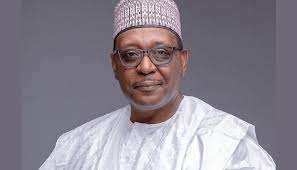It was clear participants were concerned and there was obvious need for urgent positive actions as speakers after speakers extrayed the Nigeria’s health landscape in Ladi Kwali Hall of Abuja Continental Hotel, formerly Sheraon Hotel last week. Stakeholders in the health sector from all over Nigeria had converged in the hall to discuss dispassionately and provide sustainable solutions to challenges in health sector and accelerate progress towards achieving Universal Health Coverage (UHC).
The occasion was the Health Systems Emerging Solutions Forum organised by the Development Governance International (DGI) Consult. The forum has as its theme: Optimizing Resources for Accelerated Progress Towards Universal Health Coverage and was attended by governmental and NGOs working on health development projects, agencies of government, representatives of international organisations and other stakeholders in healthcare development. Some health development experts and academics from Europe and United States of America also joined the forum discussion virtually.
The main challenge participants were determined to find solution to is the worrying fact that despite the appreciable interventions and relatively improved funding of the health sector in recent years, health indicators in Nigeria still remain embarrassing, one of the worst in Africa, for instance, the mortality rate is still high. Nigeria ranks number one globally on malaria burden which translates to high rate of child illness and death. Nigeria accounts for nine percent of the world HIV burden and is second country with highest number of people living with HIV. These are just some of the indicators. Experts are worried that human and financial investment in health has not significantly improved health indicators and the likelihood of Nigeria achieving Sustainable Development Goal (SDG) health-related goal by 2030, given the slow progress being currently recorded, is doubtful.
Speakers passion
The participants’ passion were obviously fired by the unspiring indicators and the determination to, once and for all, get the numbers tumbling down. Local Health System Sustainability Project’s Dr Bolanle Olusola-Faleye and other early speakers set the tone for the discussion, stating that the gathering must not end as just another talk shop. She emphasized that there must be concrete and sustainanble solutions to get the health sector development right, from now on and end the unending lamentations about the embarrassing health indicators.
“More often, health managers and administrators are at the crossroad of appearing to explain more resources for health and having very minimal improvement in health indices, we say we not only need more money for health but more health for the money. As a country, even at the abysmally low health expenditure, we cannot say we are getting the most out of the lean resources. Even in states that are well above the minimum 15% budget allocation, we still cannot confidently say that there are sifnificant improvement in their health outcomes. I personaly look forward to the sector-wide approach of the present health leadership in the country. This important and strategic meeting on optimization of health resources must chart a way forward significantly and put our country on the global map of significant health improvement.”
The national vice chairman of the Forum of Health Commissioners in Nigeria and Hon commissioner for health, Yobe state, Dr Muhammed Lawan Gana also noted that huge amount is being spent on health but the outcomes are not commensurate to the investments that have been made. He stated that, “The forum is about how these resources can be aligned and attached to the result so that whatever dime we spend, we have a commensurate result that is associated with it.”
Interestingly, the forum noted that there have been pockets of productive efforts at national and subnational levels that could help optimise reources for health. The managing partner of DGI, Dr Gafar Alawode noted this in his welcome address that the maiden edition of the Health System Emerging Solution Forum would feature potent interventions geared towards optimising health resources, especially manpower, money and materials. He disclosed futher that the forum is an avenue to dwell on how to use what is strong to change the narrative about what is wrong.
“Across the country, examples abound about productive efforts geared towards health system repositioning, from Yobe state where the health indices have improved to Gombe state where digital technology has reduced the number of ghost workers, to Nasarawa state where equity fund and fruitful community engagement have expanded access of the poor to quality health care to Delta state where the responsiveness of the political leadership has given health insurance coverage to almost 1.5 million residents”.
Dr Alawode noted further that DGI realised the importance of having a platform that showcases the various innovations and interventions being implemented locally and internationally, for better understanding and to enhance the chances of sustainability, replication and ultimately, impact and scale.”
In a keynote paper presentation, a professor of Health Systems and Policy, London School of Hygiene and Tropical Medicine Dina Balabanova, emphasized the need to tackle the menace of corruption and the harmful effects on health development.
The country director, Pharm Access Nigeria Dr Njide Ndili and the director of programme Yobe State Community Health Management Agency Mr Suleiman Dauda identified the need for political will and support, need to develop trust in the system, maximising funding, ensuring value for money focusing on technology to achieve UHCl, data utilisation to improve health insurance as well as horizontalising donor funds and assistance.
Speakers at the forum including the chairperson Universal Health Coverage (UHC) forum and veteran health journalist, Chief Mrs Moji Makanjuola, representative of the director general, National Health Insurance Authority, Dr Kelechi Ohiri, the country director, Christian Aid Mr Temitope Fashola, representative of Zenith Bank, Nancy Ozuagwu and Dr Chika Offor of Health Sector Reform Coallition agreed that health sector indices have not improved to reflect the money spent on health and that there is a need to have more money accompanied by a system of accountability for health to improve the country’s health indices.
Other speakers and participants at the forum include Dr Jimmy Arigbabuwo, president, HealthCare Providers Assocaition of Nigeria, Dr Chinekwu Oreh, health advisor, Nigeria Governors Forum, Dr Diana Bower, course director, International Health Systems Programme, Havard School of Public Health, Unted States, Dr Olumide Okunola, senior health specialist, World Bank and Dr Gaza Gwamna, the Hon commissioner of health, Nasarawa state and immediate past executive secretary, Nassarawa State Health Insurance Agency. Others include Dr Fatai Ogunlayi, public health specialist and consultant and Dr Babagana Tijjani, the executive secretary, Yobe State Contributary Health Management Agency.
Commendations
The forum noted and commended the policy direction of the current administration and the four cardinal areas of focus of the coordinating minister of health and social welfare Prof Muhammed Ali Pate which include effective governance, efficient, equitable and quality health systems, unlocking value chain, promoting clinical research and development, and health security. The setting up of a committee to develop the Basic Healthcare Provision Programme (BHCPP), incorporating the redesign of the Basic healthcare Provision Fund (BHCPF) was also noted.
Participants showcased sustainable interventions and innovations, both local and international that will be useful in optimising health reources and achieve Universal Health Coverage.
In Gombe state, for example, Dr Ismail Jibrin who designed the innovative state biometric attendance programme which has been a game changer in human resource for health management through technology, explained how the programme works and highlighted its positive impact on health indices through enhanced health workers attendance and productivity.
At the end of the strategic health reources optimisation meeting, there were recommendations for policy makers, development partners and civil society organisations. There was a strong emphasis on governance and accountability as well as political will of leaders. The forum agreed on the need for institutionalising the national health accountability framework, including finance, performance and social accountability to significantly improve on the value for the resources expended on health.
The need to leverage on private sector resources for health development was also noted as important especially through the purchase of health insurance premium for the poor and the indigent.
The forum noted that leveraging on digital technology would improve and maximise resources in health facilities and called for the implementation of technology-driven health system including at the primary healthcare level. The need for systematic collection of data from the basic healthcare provision fund, from the facilities and employing digital mechanism to disseminate the data for governance was emphasised. It was agreed that the use of technology would improve transparency and trust in health system management.
Benefits from the summit
One major dividend of the forum discussion was the establishment of the Universal Health Coverage (UHC) Emerging Solution Repository, an online knowledge management platform which would help sustain conversation beyond the forum’s one day engagement. The repository introduced by DGI will be used to collect, process and disseminate information on promising health system initiatives and innovations.
Some notable personalities, stakeholders and organisations who have made landmark achievements and remarkable contributions to the advancement of the cause of Universal Health Coverage (UHC) in Nigeria were recognised for their meritorious service and presented with awards by DGI.
Participants commended the DGI for putting experts together for the programme and for the establishment of the Health Systme Emerging Solution and for all the efforts and activites of the organisation towards achieving Universal Health Coverage.
To the participants and stakeholders in healthcare development in Nigeria, this current efforts to optimise health resources may be a game changer Nigeria needs to change the narratives and begin an era of improved health indicators and outcomes in Nigeria
Alawode, A public relations and development communication specialist writes from Ilorin, Kwara state.




